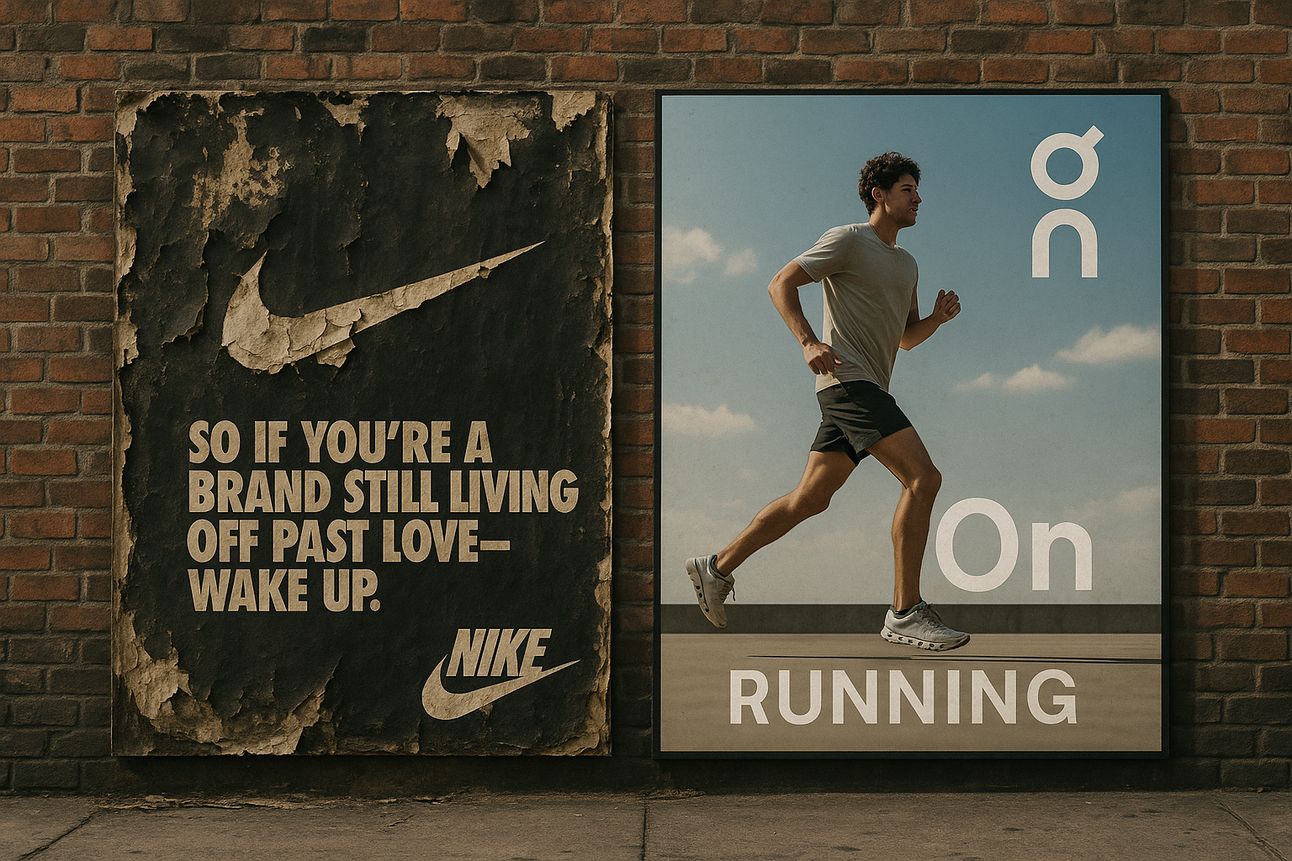JUST DO IT.
That slogan once inspired generations to act, move, and push past limits. But in today’s market, Nike has become the brand that doesn’t do the one thing that matters most: listen.
For decades, Nike built an empire by selling aspiration. They showed us Michael Jordan soaring through the air, and we chased the dream of becoming like him. But in the 21st century, something changed. Consumers stopped chasing who they saw on a billboard. Now, they want products that affirm who they already are.
This shift isn’t subtle—it’s seismic.
From Iconic to Ignored
Let’s put this in simple terms: If you’re in a relationship and you love someone, you don’t keep bringing home groceries they didn’t ask for. You ask. You anticipate. You serve.
Nike stopped doing that. They stopped listening to their most important stakeholder: the customer.
For decades, Nike didn’t just sell shoes—they sold transformation. They put a cape on your back and called it performance wear. You weren’t just wearing Jordans—you were chasing flight. But in today’s market, consumers aren’t chasing. They’re curating. They’re customizing. They’re self-authoring their identities. And Nike missed that memo.
Love Means Listening—And Nike Stopped
Nike didn’t fall off. It tuned out.
Brands that love their customers don’t drop the same silhouettes with a new colorway and call it innovation. They listen. They adapt. They evolve. Nike used to do that. Then they got too big to bend.
Consider this: in 2018, Hoka was barely a blip on the radar. Now it’s a $1.8 billion brand. On Running? Over $2 billion and growing. These aren’t one-hit wonders. They’re seismic shifts in market gravity. Why? Because they didn’t design for the fantasy version of their customer—they designed for the reality.

HOKA Campaign
While Nike doubled down on swagger, Hoka built shoes that hugged aging joints. While Nike pushed style, on cloud engineered bounce and breathability. The result? Nike’s once-dominant share in running is shrinking. From 23.4% down to 22.1%. In retail outlets like Dick’s Sporting Goods, their shelf space dominance fell from 39% to 32%—a loss of trust disguised as a drop in market share.
Wall Street noticed. Nike’s stock is down 25% in 2024, and over 30% from its peak in 2021. These aren’t blips. They’re the symptoms of a brand that stopped listening.
When They Listened, They Won
And that’s what makes this fall so painful: Nike knows how to listen.
Kobe Bryant didn’t just want a basketball shoe—he wanted a tool. He came to Nike and asked for a low-top, unheard of at the time. They thought he was nuts. But he wasn’t selling shoes. He was solving for speed, agility, and court feel. Nike listened. The result? The Kobe IV, a shoe that redefined basketball footwear.

Kobe VI Signature Nike Shoe
Same story with LeBron. He wanted something that matched his playing style: powerful, fast, and unbreakable. Nike collaborated, iterated, and delivered. That line still dominates courts and culture.

Lebron James Nike Campaign
But here’s the twist: Nike never extended that same respect to the average customer. To the 42-year-old dad with bad knees who still wants to run. To the former athlete who’s traded hardwood for hiking trails. To the people who aren’t building a highlight reel, but are trying to make it through the week with a body that creaks like a screen door.
Instead, they got lifestyle drops. Another retro. Another “collab.” Another billboard.
And the people walked.
Demand Doesn’t Worship Anymore—It Chooses
Let’s zoom out. This story isn’t just about sneakers. It's a business masterclass hidden in plain sight.
Demand has changed. It no longer worships the aspirational image on the billboard. It demands to be seen. Heard. Served. Consumers aren’t passive—they’re participants. They’re co-creating identity through every purchase, every click, every unboxing video they film in their bedroom for an audience of twelve.
Today’s best brands don’t assign identity. They recognize it.
That’s why Hoka’s shoes look like marshmallows with rocket boosters—because people asked for soft landings and propulsion. That’s why “On Cloud” Running shoes Cloud- tech feels feel like trampolines—because runners asked for responsiveness. These brands aren’t leading the market; they’re being led by it.

On Cloud Ad Campaign
It’s not about celebrity anymore. It’s about civility. Care. Community. If you don’t listen to the real needs of real people in real time, they will find someone who does.
The Myth of Eternal Loyalty

by CoCreate Media Studios + Sora
Nike’s mistake is one every brand is tempted to make: assuming loyalty is a permanent condition.
It’s not. It’s a lease.
Every purchase, conversation, and ad is a chance to renew—or cancel—the contract.
Consumers aren’t emotionally loyal. They’re emotionally practical. If you make them feel seen, they’ll follow you anywhere. If you ignore them, they’ll ghost you and post about it on Reddit.
The same culture that built Nike into a $180 billion company is now begging it to show up like it once did, to innovate like it means it, to respect the everyday runner, the aging athlete, and the mom with plantar fasciitis who still wants to feel fly.
The message is loud. It’s clear. It’s honest:
Don’t just tell us to do it. Ask us what we want to do, and build for that.
The Real Takeaway for Every Brand
Nike’s current slip is a warning shot for anyone building something.
Let this be the lesson:
Don’t build for your fantasy customer. Build for your actual one.
Don’t push identity. Solve problems.
Don’t assume loyalty. Earn it daily.
Don’t just drop products. Deliver care.
This isn’t about shoes. It’s about survival. In a world where consumer attention is fragmented and trust is scarce, the brands that thrive will be the ones that serve, not sell.
So if you’re building something right now—whether it’s a business, a community, or a movement—ask yourself:
Are you still listening?
If not, don’t be surprised when your audience stops talking back.
Don’t Do It.
Nike’s slogan told the world to leap. But the future belongs to brands that listen before they land.
So don’t ignore your greatest stakeholder, your consumer demand, don’t overestimate your relevance, and don’t assume you’re customer is still in love with your brand just because they once were.
Listen to your customer and act. Demonstrate the love and value you have for your customer.
At CoCreate Media, we give customers the ability to express what they want and give brands and content creators the opportunity to listen and act.
Lead. Don’t Follow.
Join CoCreate and subscribe.

